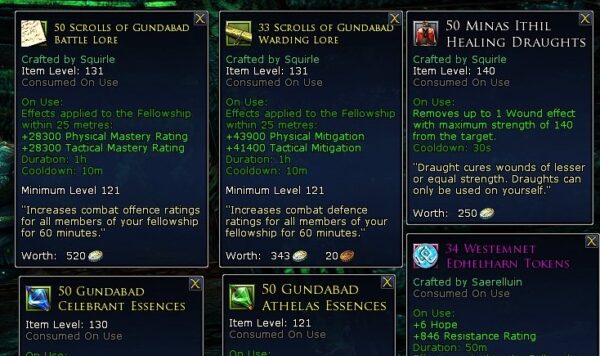Written, but a never completed draft from May 2020. Probably not complete, but a nice read or an intro if you want to take your first steps in larger groups. Most of it applies to Hiddenhoard now. Except just a bit worse of a raid in hindsight then Remorchant
Make sure you want to raid
May be a strange start to a raid guide, but do ask yourself what you’re looking for. Raiding is a seperate activity that requires alot more time, effort and preperation and wipes compared to your garden variety instance or questing.
Depending on the type of raid it can be easy such a skirmish raid or some old level 50 raid as the Rift. But a higher tier Remorchant might require joining a different kin and/or several nights a week.
Getting ready before the raid
Plenty of boxes can be ticked of before you start looking for the raid. Having all these done before makes sure you can join without a hitch and make a good (first) impression.
Discovery deeds
Like plenty of instances a lot of raids require certain quests or visiting a landscape location to be able to enter the raid. Remorchant requires you to visit the Torech Ungol cave (north east) which requires a captain summon or Cirith ungol quests to enter it. These deeds are on a character basis so if you sign up with a tank and healer make sure both have it.
Type of raid
Is it a quick easy raid, a high difficulty or just a first boss farm. The type of raid or group you’re joining will decide how far along you’d have to be on the specific character.
Tactics
It’s never a bad idea to read up on tactics (if available). A prancing pony skirmish raid for seals doesn’t have that much tactics to them. But every raid is more complex and bosses usually have specific roles or phases that can easily kill you. Not all raid groups will have time during a fight or want to explain all aspects of a fight
For remorchant there are multiple videos of people completing bosses on tier 1, 2 or 3. Only boss 1 currently has a written guide for it over on Dadi’s guides. For boss 2 find your class roles video on Thossulun the Massive, boss 3 Rûkhor the Pale Herald and boss 4 Shelob.
Expected class role
In a raid you will be mostly expected to do whatever your class is “supposed” to do in a raid. A beorning will not be asked for as dps class or a champion will not be tanking how much you’d want to be doing that. For your class you’re also expected to have the gear for that role.
A loremaster is often expected to crowd control mobs in which there is no room for a resist. Which will often mean bringing some special gear that up your finesse to far above normal values. A runekeeper healing in his dps gear is far less effective then needed.
Voice chat
Being able to hear people on a voice chat client is often asked for. Depending on your role a microfone to speak is a 2nd step. Tanks asking for extra heals or a healer letting the raid know that his ress is on cooldown isn’t usually done by text chat.
These days most use Discord which doesnt require an installation, but it helps to keep in touch or have the setting done. Other options kins uses is Teamspeak or Mumble which do require a programme to be installed before use. Making sure it’s done before the raid start helps a lot.
Character specific
Gear
Essences
Legendary weapon
Account
Make sure that whatever you need is on the character you’ll be bringing to the raid. A lot of gear like Shadow king earrings or Thrang pocket items can be shared across characters. But having to gather everything while 11 people are waiting for it is less nice. Consumables is easier to forget it was on another character.
Consumables
Speaking of consumables, any buff you can consume is an improvement. Otherwise it wouldn’t be a buff. Which consumables you need is often determined by the raid tier. You can either craft them yourself, trade with others or buy them from the auction house.
Basic consumables

Morale and power potions, Hope token, offensive and defensive scrolls and an assortment of draughts to remove extra wound/fear effects.
Personal buffs
Every class has potions or consumables, cooked food with stats available to them. These provide small, short duration, but still very noticiable buffs for yourself. For a more casual raider or tier 1 you might not have these. On higher tiers or when push comes to shove you’ll be required to have these with you usually.
Expert consumables


These consumables are temporary, but make a large enough difference that on any raid that is pushing the limits of your group of gear at the time is using these. Personally i don’t raid on these and as such don’t use them. But it’s good to be aware of that they exist.
Acquiring these buffs cheaply
Tome of defence, attack damage and morale scrolls come from the Gift boxes you can open at early levels. Or have a chance to drop from lootboxes opened.
Create a new character, level it to 20 through crafting. This will allow you to open lootboxes with keys gotten freely from Year 3 or 7 anniversary giftboxes. The Gift boxes will give you some slayer accelerator and other items. For a full guide see **insert link**
Plugins
Raiding requires paying attention to yourself, others, bosses, mobs and a plethora of other details. The default lotro settings can be improved a lot. Plugins allow you to do that. From more visible alarms, to reminders to use a certain skill or a large “Get out” on you screen it can do alot.
While there are more dedicated plugins available for every aspect. One plugin can do a lot of it good enough out of the box.
Use Plugin compendium to make installation easier – https://www.lotrointerface.com/downloads/info663-LOTROPluginCompendium.html And use it to install Prime plugin and keep it and others up to date
https://www.lotrointerface.com/downloads/info1085-PrimePlugin.html
Other good raid plugins are
- https://www.lotrointerface.com/downloads/info1015-DebuffVitals.html
- https://www.lotrointerface.com/downloads/info1143-Gibberish.html
- https://www.lotrointerface.com/downloads/info896-SequenceBars.html
Have and be on time
One of the large difference between a raid and any other activity is the time it takes. A run of stairs is done in 15 minutes. While a raid is usually 1-3 hours. If you’re joining a run that starts at 8, be ready at 8. Do you need to go at 8:30? Probably not a good idea to join that evening.
Communicate with the organiser of the raid if there are issues. You have a doorbell riniging, 1 word in chat is better then none. Can’t stay that extra hour due to work the next morning. Tell him. They can look for a replacement in time and continue with a downtime. It’s group effort and you’re part of that group.
Getting invited back
This might be tad contentuous. But raiding usually happens with a fixed group for higher tiers. Even within repeat runs the raidleader will most likely send some messages to that minstrel that did so well last time before going to /lff. A bad reputation will last you a lifetime though. On the other hand not every raid pans out. Like most friendships and relations, don’t be a jackass and being consistant is key.
Starting your own raid
If all else fails. Start your own raid. You can wait a very long time if you wait for someone to start that Fire of Smaug T2 Challenge. Especially for raid that (over time) become well known. Boss 1 T3+ in Remorchant was not done on day 1, but overtime as people got better gear it was run endlessly by plenty of people that hadn’t even seen Shelob yet.
